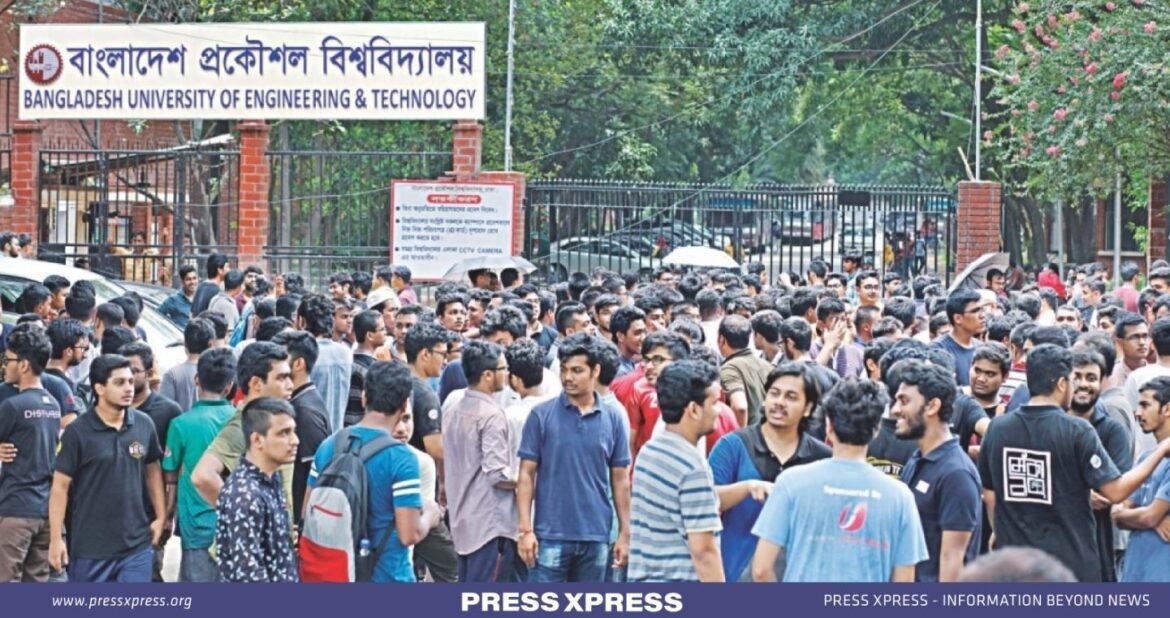Bangladesh University of Engineering and Technology (BUET) campus has been free from all sorts of political activities for the last few years, and this vacuum has been filled by the anti-liberation political party Jamaat-e-Islami’s student wing Islami Chhatra Shibir and hardcore Islamic extremists Hizb ut-Tahrir very silently.
How this has happened? If we check back, then the findings are visibly related to the situation that in 2019, Abrar Fahad, a student at the Bangladesh University of Engineering and Technology (BUET), suffered an unexpected, tragic, and heart-wrenching death. In response to this incident, the government took steps to bring those involved to justice in accordance with the country’s laws. The court sentenced 20 students to death and gave life imprisonment to 5 others in the Abrar Fahad murder case.
You Can Also Read: BANGLADESH’S OPPOSITION PARTY GRAPPLES WITH FOREIGN POLICY DIVISIONS
As a result of this incident, BUET students initiated protests to ban all kinds of political activities on campus. Their protests eventually led to a ban on all forms of politics within the BUET campus. Subsequently, several progressive student organizations, including the Chhatra League, the student wing of the ruling party, and leftist groups, suspended their organizational activities on the BUET campus. However, taking advantage of the absence of progressive student organizations on campus, Islami Chhatra Shibir and hardcore Islamic extremists Hizb ut-Tahrir are conducting their clandestine activities within the university without any hindrance.
“There is an allegation that some militant groups are secretly conducting their (BUET) activities there. We will investigate the matter. If an individual has such a mindset, he or she must stop it. Those who are working on militancy (special team of Counter Terrorism) will look into the matter. It is applicable for all organizations, not just one. We are monitoring the matter.”
Mahibul Hasan Chowdhury, Education Minister
Four years after the ban, the incident has once again ignited tensions at BUET. On the night of March 28, 2024, several members of the Chhatra League, including the central president Saddam Hussain and the office secretary Imtiaz Hossain Rahim, entered the BUET campus. Subsequently, the Islamist extremist groups become afraid of losing their unilateral ground for anti-state activities, and immediately, in the name of the general students or under the general banner, Islamist extremist groups have started playing the anti-BCL card and pulling the strings behind the scenes. As a result, on the surface, students demanded the expulsion of Imtiaz from BUET. Along with this, they have added four additional demands. In total, they are now protesting with five demands. As part of their protest, they have announced a boycott of all academic activities, including the final term examinations.
Allegedly, for assisting the Chhatra League, the BUET administration canceled the residential seat of Imtiaz Hossain Rahim, a student from the 21st batch of the Department of Architecture. Experts and student political leaders claim that the cancellation of the residential seat violates our nation’s constitution.
How the decisions violate Constitution?
The Engineering and Technological University Ordinance, 1961 establishes BUET (Bangladesh University of Engineering and Technology) as an educational institution in Bangladesh. According to this law, BUET must be governed by the constitution and prevailing laws of the country.
Nowhere does this law grant BUET the authority to prohibit student politics on the campus, and cancel student’s seat for engaging with any progressive political party.
By taking this step, the BUET administration has violated the constitutional provision (Article 38). This action simultaneously violates Articles 27 (equality under the law), 31 (right to take shelter under the law), 32 (right to life and personal liberty), 36 (freedom of movement), 37 (freedom of assembly), and 39 (freedom of thought and conscience, and freedom of speech).”
“But a banned organization like Hizb-ut Tahrir, and Islami Chhatra Shibir have taken this as an opportunity to work here. The 2019 killing of student Abrar Fahad by a group of BCL activists, which led to the ban on politics, pains them as well, but the students’ emotion centring the incident was being used to fuel the current protests. After we organised the demonstration with the slogan – Rise Above Fundamentalism, we were targeted and held accountable in personal attacks, We were quizzed from 11pm to 4 am in the rooms of different halls. False information about us were disseminated to general students following instigation by a group. Two of us faced ragging by 70-80 people. We were threatened to be forced out of the halls after our human-chain demonstration was labelled a crime.”
– Ashik Alam, Department of Chemical and Materials Engineering, 20th batch
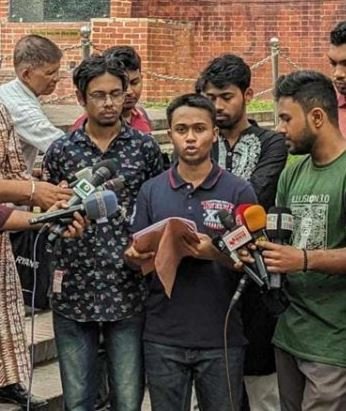
Shibir’s Role Behind Student Protests
Although student politics is prohibited at BUET, the protesters’ primary goal is not to allow the Chhatra League on campus as because Islami Chhatra Shibir and the banned organization Hizb ut-Tahrir are the key players to get grow and hold their unilateral ground. But, Islami Chhatra Shibir and the banned organization Hizb ut-Tahrir have enjoying their underground activities discreetly.
Members of these organizations also convene in mosques or various secret gatherings. Even last year, on July 30, in Tanguar Haor, Sunamganj, 24 BUET students were arrested by the police, all associated with Shibir’s politics. The police detained them from the spot where they were allegedly planning militant activities.
Baytul Mal (Finance) secretary of the Shibir BUET branch, Afif Anwar, was also arrested there. Currently, they are all out on bail. Despite witnessing incidents of political activism by the Islami Chhatra Shibir at BUET, the administration and the so-called ‘protesters’ took no action against them.
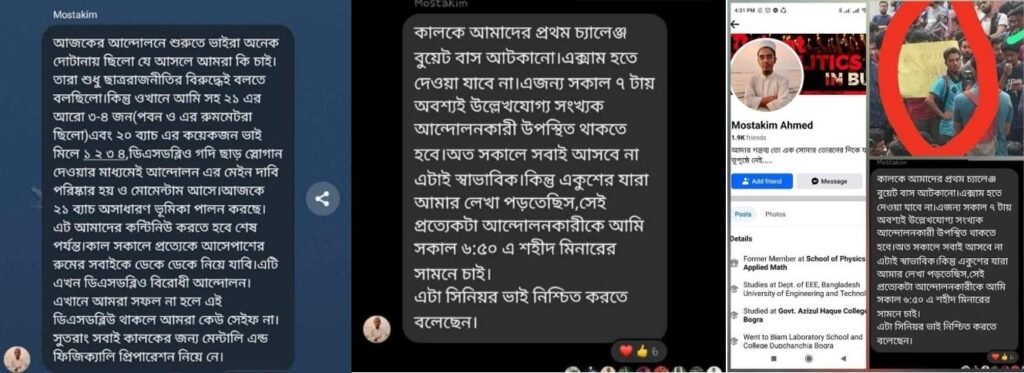
Even this time, during the protests, several screenshots leaked to social media show Shibir leaders leading the protests to ban student politics on campus and instructing them to disrupt the educational activities on the campus.
Traces of Fundamentalism
Despite the ban on student politics at BUET since 2019, the extremists have continued their activities unabated. A former leader of the Bangladesh Islami Chhatra Shibir has openly acknowledged this fact.
Dr. Shafiqul Islam, a former president of Chhatra Shibir, stated on social media platforms. He said ‘ “As Buet is an institution of the toppers (students) of Bangladesh, we must have to confirm a good presence there. It’s normal”
In addition, former BUET student Sirajul Islam became the president of the Chhatra Shibir central unit. His role as a top leader of Shibir demonstrated a significant presence of Chhatra Shibir activists at BUET.
Taking advantage of the situation, Islamic extremist groups like Hizb ut-Tahrir have also resurfaced their activities. A few days after the declaration of prohibition, a special team from the Anti-Terrorism Unit of the Bangladesh Police arrested a former student of BUET named Jahidul Islam, also known as Jahid. The arrested individual was the head of the Dawah department of Hizb ut-Tahrir’s Dhaka-East branch and a prominent member of their media wing.

Jahid confessed to the police that he became involved with Hizb ut-Tahrir during his time at BUET. Since then, he has regularly held confidential meetings with members of Hizb ut-Tahrir at various places, intending to overthrow the current government and establish the Khilafah Rashidun in Bangladesh.
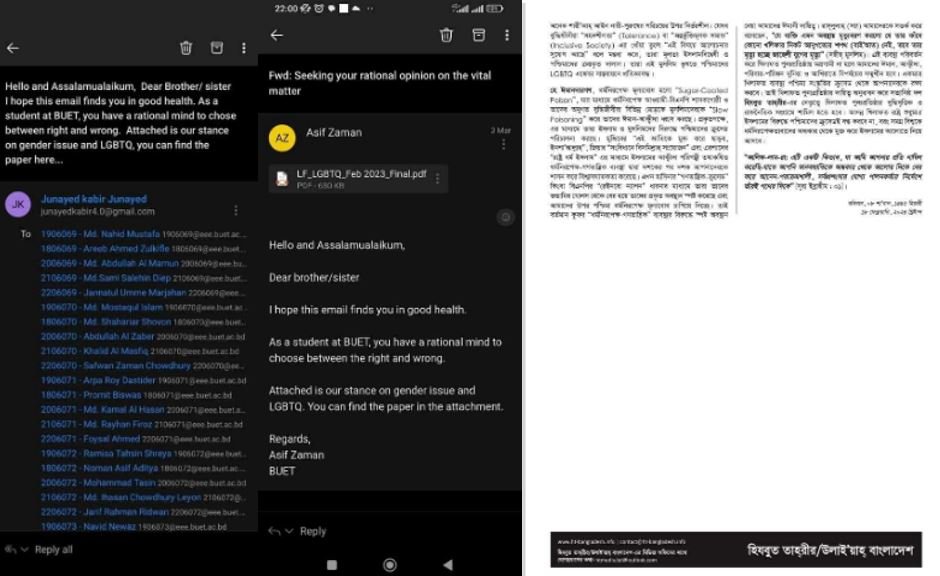
In the name of a free political campus, these Islamic extremist organizations operate within the BUET without any hindrance. They even use students’ official email IDs to propagate extremism. Additionally, they have spread posters with QR codes around the campus for further dissemination. Even a decade after the ban, the visible activities of this organization in places like BUET remind us of the absence of progressive politics.
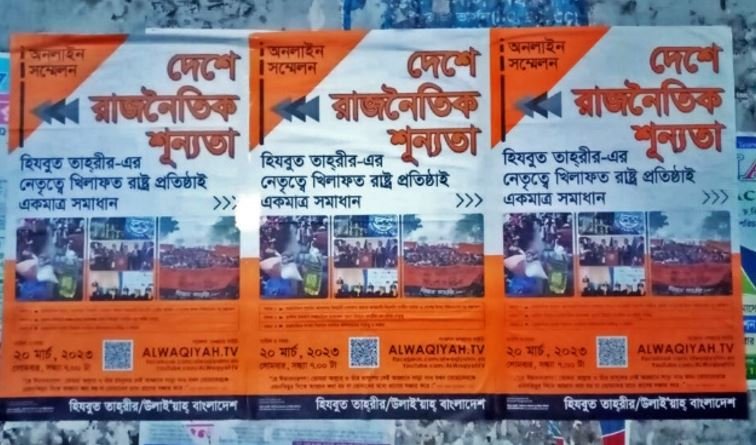
HC Allows Student Politics
On April 1, Following the constitution of the country, the High Court has stayed the decision to ban student politics at the Bangladesh University of Engineering and Technology (Buet). The court also issued a rule asking why the decision to ban student politics on campus should not be deemed illegal.
The order came in response to a writ petition filed by BUET student and Chhatra League leader Imtiaz Hossain Rahim Rabbi.
Beyond question, student politics played a great role in Bangladesh’s struggle for independence and has been an integral part of national politics. However the banning of student politics in the BUET campus could only clear the way for extremist organizations like Shibir or Hizb ut-Tahrir’s cunning policy to deepen their roots without acknowledging the independence of Bangladesh.

